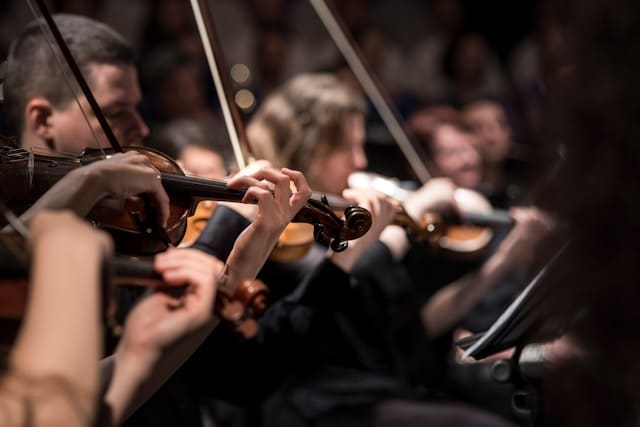Learning a musical instrument can be an exciting endeavor, full of potential for personal growth and satisfaction. It can also be a daunting task, especially if you’re an adult who’s trying their hand at music for the first time. But and there’s no need for fear. There are plenty of strategies and techniques that can make learning a musical instrument as an adult a rewarding experience. Whether you’re interested in playing the piano, the guitar, or any other instrument, the following sections will provide some guidance on the best ways to approach your music lessons.
Embracing the Learning Process
When it comes to learning an instrument, what’s crucial is your mindset. As adults, we often forget the joy of learning something new. It’s important to embrace the journey, with all its challenges and rewards. Remember, it’s not about how quickly you can play a piece perfectly but about progress and growth.
A lire également : How Can Virtual Reality Simulations Train UK Firefighters for Complex Situations?
Patience is key. Understand that learning to play an instrument takes time. Every proficient musician you admire didn’t learn their skills overnight. They’ve spent countless hours practicing, making mistakes, and refining their technique. So, when you find yourself struggling with a piece, remember that it’s part of the process.
Consistent practice is another essential aspect of the learning process. It’s better to practice a little every day than to cram several hours of practice into a single day. Regular practice helps you develop muscle memory and fine-tune your technique.
Cela peut vous intéresser : How to Build a Personal Brand on Social Media as a UK-based Artist?
Choosing the Right Instrument for You
Choosing which instrument to learn is a personal decision. What resonates with one person may not work for another. Your choice will likely depend on your musical tastes, the time you can dedicate to learning, and the resources available to you.
Consider the practical aspects. Some instruments, like the piano or drums, require more space and can be more expensive than others. Instruments like the guitar or ukulele, on the other hand, are portable and often less costly.
When choosing an instrument, think about what kind of music you want to play. If you love classical music, you might consider learning the violin or piano. If you’re more into rock or pop, the guitar or drums might be more up your alley.
Remember that it’s never too late to learn and don’t be afraid to try out different instruments until you find the one that fits you.
Finding the Right Teacher
Having the right teacher can make a significant difference in your learning experience. A good teacher will guide you, motivate you, and help you overcome technical difficulties. They can provide valuable feedback that can accelerate your learning process and make it more enjoyable.
When looking for a teacher, consider their teaching style and approach. Some teachers are more flexible, while others stick to a more structured curriculum. Find someone who aligns with your learning style and musical goals.
It’s also advisable to find a teacher who has experience teaching adults. Adults learn differently than children, and a teacher who understands this can better tailor their lessons to your needs.
Leveraging Online Resources
In the digital age, there’s an abundance of online resources that can supplement your learning. YouTube tutorials, music learning apps, and online music courses are just a few clicks away.
These resources can be particularly useful if you’re self-taught or if you’re looking for ways to practice between lessons. They offer flexibility, allowing you to learn at your own pace and on your own schedule.
However, remember that while these resources can be valuable, they should not replace a dedicated teacher. Online resources are great for mastering specific skills or songs, but a teacher can provide comprehensive instruction and address your specific needs.
Joining a Musical Community
Learning an instrument doesn’t have to be a solitary endeavor. Joining a community of musicians can enrich your learning experience. This could be a local music club, an online music forum or even a group class.
Being part of a community allows you to share your experiences, ask for advice, and learn from others. It can also provide opportunities for collaboration and performance, which can be both fun and educational.
In conclusion, while learning an instrument as an adult may seem daunting, it’s definitely achievable. With the right mindset, the right instrument, a good teacher, and the use of online resources and communities, you can embark on a rewarding musical journey. Remember to be patient, practice regularly, and most importantly, enjoy the process. Music is, after all, a source of joy and fulfillment.
Overcoming Challenges in Learning Music Theory
Music theory is often regarded as one of the more challenging aspects of learning an instrument. As an adult, it might seem like a daunting mountain to climb. However, a basic understanding of music theory can significantly enhance your playing abilities and overall musicality.
Music theory involves understanding the fundamental building blocks of music, like scales, chords, and rhythm. It’s somewhat similar to learning the grammar of a new language. Just as you would struggle to frame a sentence without understanding grammar, you might find it difficult to play a piece of music without grasping the basic theory.
There are numerous online resources and books available that can help you get started with music theory. Start with the basics and gradually build up your knowledge. This approach will make the process less overwhelming.
Remember, learning music theory is not simply a process of rote memorization. It’s about understanding how music works. It’s about seeing the patterns, the relationships, and the underlying structure of the music you play.
One useful technique is to apply the theory you learn to the pieces you’re working on. This hands-on approach can help you understand the practical application of theory and make it more relevant and interesting.
Incorporating Regular Practice Sessions
Regular practice is the key to mastering an instrument. It’s the cornerstone of your learning journey. As an adult, you may have various responsibilities that could limit your practice time, but it’s essential to carve out dedicated time for your music lessons.
Start by setting realistic practice goals. It’s not about the quantity, but the quality of practice that counts. Even just 15 minutes of focused, deliberate practice can be more beneficial than an hour of mindless playing.
During your practice sessions, focus on one thing at a time. It could be a tricky passage, a new technique, or a specific aspect of music theory. This focused approach can help you make significant progress over time.
It’s also important to incorporate variety into your practice sessions. Playing the same piece over and over can lead to boredom and stagnation. Work on different pieces, experiment with different styles of music, and challenge yourself with new techniques. This can keep your practice sessions interesting and enjoyable.
Above all, remember that the goal of practice is not to achieve perfection, but to improve. Every time you sit down to practice, aim for progress, not perfection.
Conclusion
Learning a musical instrument as an adult can be a truly fulfilling experience. The journey might be challenging, but with the right strategies and techniques, it can also be immensely rewarding.
Embrace the learning process, choose the right instrument, find a supportive teacher, leverage online resources, join a musical community, overcome the challenges of learning music theory and incorporate regular practice sessions. These strategies can help you navigate your musical journey and make the most of your music lessons.
Remember, it’s not about how fast you can learn to play an instrument, but about the joy and fulfillment you derive from the learning process. So, take your time, be patient, and most importantly, enjoy the journey of learning to play a musical instrument.






